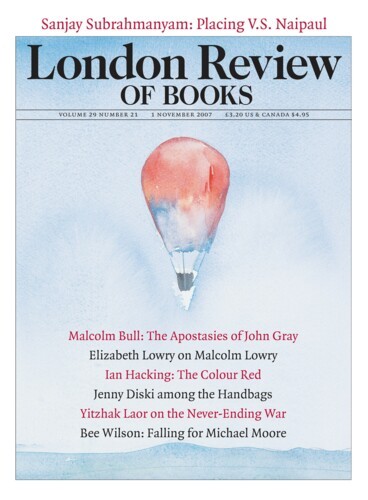‘A Spasso con Gusto’ is the untranslatable name of the culminating event of the week-long Slow Food festival that has taken place in the medieval Umbrian town of Orvieto every autumn since 1996. Spasso is an Italian noun that more or less corresponds to the English ‘leisure’. Andare a spasso is ‘to go for a walk’; essere a spasso is ‘to be out of work’: mandare qualcuno a spasso is ‘to give someone the sack’, not to send them out for a stroll. Gusto means ‘taste’ or ‘flavour’, but also ‘enjoyment’. The phrase, then, has connotations of walking, leisure, flavour and enjoyment, but what it boils down to is spending a very long time over lunch.
The English version of the festival programme describes ‘A Spasso con Gusto’ as a ‘very special enogastronomic walking tour’. It’s a traditional Italian meal, but with each course served in a different picturesque location with a different selection of local wines. Each of the thousand or so participants was given a souvenir wineglass and a natty blue canvas pouch on a string for carrying it in; I only saw one smash all afternoon. The antipasto – cured meats and cheeses – was served under the trees in the grounds of the decommissioned barracks at the eastern edge of town. The primo piatto – chickpea and chestnut soup – was provided by the Palazzo del Gusto (‘Palace of Taste’), an enogastronomic complex in the cloisters of the decommissioned monastery of San Giovanni, a couple of miles away to the west. We ate our main course – beef stew with polenta – just below the cathedral, looking out across the valley to the south. Pudding was a chocolate tart served half a mile to the north, in the Palazzo del Popolo.
The Slow movement isn’t just about good food and good living. It’s also about politics. On their billboard on Orvieto’s main street, the local representatives of Forza Italia had posted, in silent protest, an enlarged photocopy of an article from Il Giornale, a right-wing daily owned by the Berlusconi family, headlined: ‘Slow Food-Gambero Rosso’. Gambero Rosso (‘Red Prawn’) began life twenty years ago as a food and wine supplement to the left-wing daily Il Manifesto, and has since grown into a monthly magazine, a publisher of guides to wines and restaurants, and more recently a TV channel and organiser of foody events. The gist of the article seemed to be that a bunch of greedy lefties have the high life all stitched up and are living it at the expense of the downtrodden Italian consumer, as if the recent hikes in the price of pasta weren’t bad enough.
The appeal to the individual bottom line is typical of the rhetoric of the right; no cuddly new conservatives here. (For a while Forza Italia had a poster up showing Romano Prodi’s face with the simple slogan più tasse per tutti – ‘more taxes for everyone’ – plastered across it.) And Slow Food is very much an initiative of the left. The Second International Cittaslow Conference was held in May, in the neighbouring fishing villages of Pioppi and Acciaroli, part of the commune of Pollica in the Cilento national park, fifty miles down the coast from Salerno. Cittaslow is an international network of small towns, established in Orvieto during the 1999 food festival. According to the website of the UK branch (members: Ludlow, Aylsham, Diss and Mold), ‘Cittaslow is a way of thinking. It is about caring for your town and the people who live and work in it or visit it. It is about protecting the environment, about promoting local goods and produce, and about avoiding the “sameness” that afflicts too many towns in the modern world.’ Another, less conciliatory way of putting it would be to say that it’s a form of organised local resistance to global capitalism, a concrete example of the ‘learning to live simultaneously in a cosmopolitan web and in various and diverse primary communities’ that Tom Nairn mentioned in the last issue of the LRB.
Most of the people attending the meeting in the spring were mayors and councillors, there to share ideas about such practical matters as the best ways to encourage local small industries and artisans, promote tourism without surrendering to it entirely, and dissuade their younger residents from fleeing to the big city at the first opportunity. There were also a number of academic guest speakers, and a handful of journalists. The most charismatic of the speakers was Silvio Barbero, the national secretary of Slow Food Italy. In a fiery speech, which showed some surprising continuities with the finer aspects of Mao Zedong Thought, he talked about the importance of solidarity among non-corporate food producers across the globe; peasants and small farmers of the world, unite!
The ethos of Slow Food and Cittaslow crucially departs from Maoism, however, in its emphasis on having a good time. The first tenet of the Slow Food manifesto is that ‘everyone has a fundamental right to pleasure.’ You’re never going to manage to change the world for the better, in their pragmatic view, unless you make the process pleasurable: great leaps forward are not at all the Slow way. Perhaps Slow Food’s most radical achievement is to have wrested the appeal to self-gratification out of the clutches of the right, to have staked a claim for the left on the sensuous high ground.
Send Letters To:
The Editor
London Review of Books,
28 Little Russell Street
London, WC1A 2HN
letters@lrb.co.uk
Please include name, address, and a telephone number.

